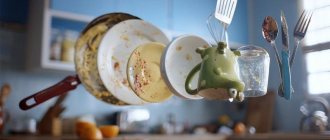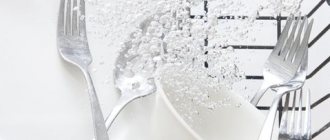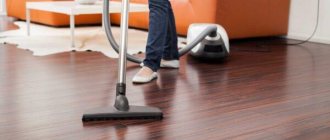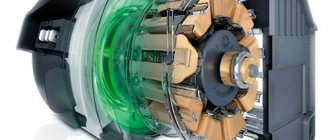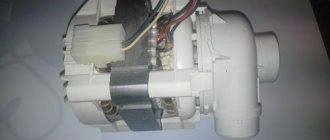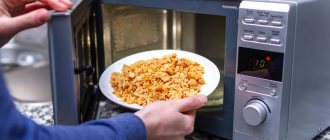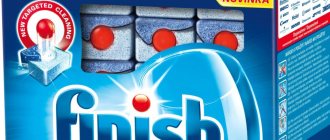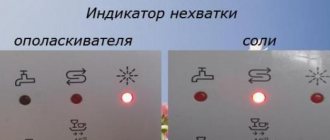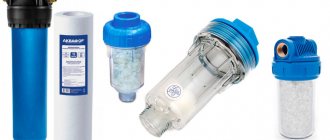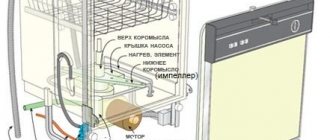When a dishwasher first appeared in my apartment, I thought - here it is, a lifesaver that will now clean the kitchen for me!
I think your first impression was about the same. And, like me, it was most likely followed by slight disappointment: a dishwasher is not a magical solution to all problems, it is just a tool. Which, like any other tool, has its limits and limitations. [/td]
| Would you like a GIFT from me personally? Enter your email and I'll send you a free recipe book! |
Washing dishes has become faster, but loading and unloading the dishwasher still takes a lot of time. It is demanding on water quality. If it breaks, it is usually at the most inopportune moment. And the worst thing is that not all dishes can be washed in it!
You probably read in the instructions before using it for the first time about what types of dishes should never be put in the dishwasher, and you’ve probably already forgotten half of them. For this reason, I decided to translate an article I discovered on my favorite English-language website about what types of dishes should not be washed in the dishwasher. This article was written by Daniel Gritzer, a man with a thorough approach and good theoretical background, so you can rely on him. And don't be alarmed by how long this list is. After studying it, you can rest assured: all other dishes can be washed in the dishwasher!
So, here's what you can't put in the dishwasher:
Knives and all cutting devices
Examples:
- any kitchen knives;
- graters;
- food processor knives;
- mixer knives;
- mandolins and hand slicers.
Causes:
There are several reasons why cutting devices should not be washed in the dishwasher. The first of them is safety. If you or someone else carelessly disassembles the dishwasher, you risk cutting yourself by tripping on the knife or picking it up at the wrong end. In addition, detergents have a bad effect on the knives themselves, dulling them even faster, which is especially important for amateur cooks who neglect the good habit of regularly sharpening their knives.
Similarly, the handles of knives may suffer, and the metal from which they are made may become rusty. Finally, knives can also damage your dishwasher - for example, cutting the rubberized inserts, which will lead to rust.
Utensils made of any metal (except stainless steel)
Examples:
- cast iron cookware;
- carbon steel frying pans;
- non-stick frying pans;
- utensils made of enameled cast iron;
- copper frying pans, pots and other utensils;
- aluminum cookware, baking trays and other utensils.
Causes:
By and large, you should keep any metal other than stainless steel away from your dishwasher (and even that is susceptible to corrosion in certain cases). A cast iron or carbon steel pan will instantly lose the protective film of oil you've spent so much time creating and will begin to rust or at least lose its non-stick properties. Cookware made of enameled cast iron seems to be protected, but it may chip and its edges may also be damaged.
Aluminum will not rust, but will most likely lose its cheerful shine - since this metal enters into chemical reactions very readily, it is covered with an oxide film, which will quickly disappear under the influence of detergents. Utensils made of copper or brass will also lose their presentation. As for non-stick frying pans, they basically don’t require much cleaning, you just need to wipe them down (and if that’s not the case, then it’s time to replace your frying pan).
There are no markings on the container
It's rare, but sometimes plastic utensils really don't have any markings. You will have to act, evaluating the material yourself. Thick, elastic, durable plastic will probably easily withstand automatic washing. As a rule, they are made from such material:
- plastic containers for microwaves;
- Bakeware;
- ice trays;
- pencil holders;
- baskets for laundry, powder, etc.;
- glasses for toothbrushes;
- soap dishes;
- flower pots;
- hard plastic toys (Lego);
- various filters.
If you are not sure whether the plastic will withstand washing, try setting the delicate mode and placing the item in the PMM as high as possible, away from the heater. If you have a lot of plastic items and they are small, it is better to put them in a laundry bag for washing to prevent spillage.
Important! Washing disposable tableware, as well as plastic packaging for cakes, etc., in the PMM is strictly prohibited.
Fragile glass and thin porcelain
Examples:
- fine porcelain;
- plates with gilding or hand painting;
- measuring cups with marked marks;
- plates with gilding or hand painting;
- milk or uranium glass;
- fragile crystal and glasses with thin stems.
Causes:
Any glass, crystal, porcelain or ceramic dishes that are dear to you should be kept out of the dishwasher. Otherwise, you risk breaking it, which could damage your dishwasher. Painting and gilding may fade if regularly washed in the dishwasher, and glass or crystal may become cloudy and discolored. Of course, this does not mean that washing such dishes in the dishwasher is completely contraindicated, just make sure that you carefully evaluate the pros and cons.
Selecting a detergent
You cannot use regular dishwashing gels or cleaning powders, but only special detergents for the dishwasher. These can be tablets, gels or powders. Powders are more economical, and tablets are more convenient to use, because most manufacturers produce combined tablets that include components for washing, rinsing and water softening. Each housewife decides for herself what is the right thing to do.
Some housewives, wanting to save money, do not use mouthwash. As a result, a white coating is found on glass and porcelain products. It is impossible to get a perfectly clean surface without rinse aid, because this product helps water leave the walls of the product faster both during rinsing and during the drying process.
Select tablets and detergents based on the material of the dishes. You can add exactly as much detergent as suggested in the instructions. If you are greedy, you will end up with greasy, poorly washed dishes; If you overdo it, you will additionally wash off white plaque from the walls. In this case, the word “a lot” means “bad”!
All mechanisms
Examples:
- pasta machines;
- meat grinders;
- hand chalks;
- pepper and spice mills;
- pressure cooker lids.
Causes:
One day, the Tin Woodman was caught in the rain and froze in place as his limbs instantly became covered with rust. It's a long story and it has many morals: we only have heart, brains and courage if we believe in ourselves; never lie; There's no place like home—but all of that is pretty trivial compared to the big lesson in this story: If you want your mechanical gizmos to keep working, don't put them in the dishwasher.
If it has gears, moving parts, handles or valves, wash it by hand according to the manufacturer's instructions.
Some plastic devices
Examples:
- plastic cutting boards;
- plastic containers for storing food.
Causes:
Lately, we are increasingly hearing that plastic is more dangerous than is commonly thought, especially when it comes to children’s health. In particular, they say that constant washing in the dishwasher or heating in the microwave leads to its gradual destruction.
This has not yet been fully proven, and many believe that these are unsubstantiated claims of paranoids. But in the absence of clear evidence, it might be worth considering whether you should reduce the amount of plastic in your dishwasher. After all, there are many other materials that storage containers are made from - glass, metal, and so on. On a more practical level, some plastic items can be damaged by hot water in the dishwasher.
What's even better is to wash it by hand.
Aluminum, plastic and wood aren't the only materials that don't go on dishwasher racks. Do not put in the dishwasher:
- Porcelain cups and saucers. It is better to wash all porcelain dishes by hand, but thin porcelain is especially sensitive to automatic washing and turbo drying.
- Cast iron cookware. Nothing will happen in one wash with cast iron grates, pots, cauldrons and other utensils. But over time (after 2-3 washes) you will notice changes for the worse. Cast iron is damaged by corrosion - the appearance will be completely damaged, and the unique qualities will be lost.
- Crystal. Rinse your favorite crystal tableware under the tap to avoid “glass corrosion” (microcracks and scratches) and to prevent glasses and salad bowls from bursting due to temperature changes. If you still want to take a risk, then there are some tips on how to protect crystal in PMM as much as possible.
- Vacuum containers. Containers, mugs, pots and thermoses pump out air, creating a vacuum inside. With intensive washing, the beneficial properties may be impaired, and your favorite thermal mug or lunch box will not keep the food warm.
Important! If there is a mark on the thermos or thermal mug that allows it to be washed in a PMM, wash it. If you can’t find the icon, it’s better to do it manually.
- Sharp knives. There is an unspoken rule: to avoid dulling the knife, wash it quickly and under lukewarm water. If you leave a knife in hot water for a few minutes, sharpening will become worse, and constantly washing knives at high temperatures will force you to sharpen your knives several times a week.
Important! Do not put other sharp objects (blender knives, graters, barbecue forks) in the PMM - they will quickly become “dull.”
- Copper dishes, silver and cupronickel. Like aluminum, these metals do not tolerate contact with powders and hot water. Copper darkens and loses its attractiveness.
We also do not recommend sending the following items to car containers:
- silicone molds will withstand the temperature, but washing can affect their properties (according to reviews, baked goods will not stick well);
- enamel dishes (the enamel will crack);
- clay pots (cracked);
- thin ceramic dishes;
- electric grill plates (Teflon);
- refrigerator shelves (metal, painted - the coating comes off easily);
- aquarium (may come apart or crack);
- hood elements - filter and parts made of aluminum.
Cookware with a hollow handle or thermal insulation
Examples:
- corollas;
- silver plate;
- some pots;
- old-fashioned ice cream scoops;
- thermoses, travel mugs and other thermally insulated utensils.
Causes:
The author claims that he was once almost killed by a stainless steel frying pan, which had a hollow metal handle inside. He regularly washed it in the dishwasher, after which one day it literally flew into the air while heating it on the stove. It turned out that during regular washing, water seeped inside the handle, and when too much of it accumulated there, it was torn from the inside.
This is, of course, a rare case, but it serves as a reminder: water can get into cavities that are not intended for it, and this is most likely to happen in a dishwasher. A whisk or thermos may not explode like a frying pan, but the water will still take its toll - kitchen utensils may rust, mold, or lose their insulating properties.
Stop list for dishwashers
Regardless of the material, it is prohibited to wash dishes or any items with stickers in the dishwasher. These pieces of paper will definitely “peel off” from the surface being cleaned and end up in the filters.
The consequences are predictable - the PMM will most likely break immediately. It’s good if the automatic safety system works, otherwise you’ll have to call a specialist to repair the equipment or send it for service.
Aluminum and silver products
Hot water in PMM aluminum and silver is not dangerous. However, the household chemicals used for washing are extremely harmful to them. After being in the dishwasher, utensils made from these metals begin to darken and become coated.
Silver cutlery should be washed only by hand and without aggressive detergents; an automatic dishwasher is not an assistant here.
When exposed to water for a long time, aluminum releases ions. If you put a lot of aluminum cookware in the dishwasher for two to three hours at the same time, then everything inside will be “painted” with a corresponding metallic coating.
Moreover, aluminum will not only cover the internal walls of the PMM, but can also clog the nozzles on the sprinklers. Breakdown and subsequent repair of the dishwasher in this case is inevitable.
A video with visual explanations of why you can’t wash aluminum kitchen utensils in a PMM:
Wooden and cast iron objects
Wood and water are not very compatible materials. It is better to wash wooden spatulas, cutting boards and rolling pins yourself. They in PMM will first swell from excess moisture, and then shrink under the influence of high-temperature air drying.
The result will be cracked utensils, unsuitable for further use for their intended purpose. Nowadays, many wooden cutting boards are made not from a single piece of wood, but from glued pieces. If such a prefabricated product is kept in water for a long time, it may fall apart into individual elements.
And even if it doesn’t fall apart, it will definitely come apart in the glued areas. In this case, the consequences are even worse - the glue from the board will subsequently enter the body with food.
Cast iron in a dishwasher not only loses its appearance, but also begins to rust - and it will continue to rust in the future
Cast iron frying pans, cauldrons and kettles become covered with a thin film of fat over time. It protects this metal from water and oxygen, which prevents the formation of rust on such utensils.
With manual washing, greasy deposits are never completely washed away, but with automatic washing with a large amount of detergent, it disappears. And then the unprotected cast iron begins to rust.
Knives, strainers and garlic presses
Knives made of stainless steel become slightly dull after a long stay in the dishwasher. That is, the material itself is not afraid of PMM. However, the knife will have to be sharpened again after such a wash.
This also applies to graters and any other utensils with a sharp edge for cutting food. They can not only become dull, but also scratch the internal walls and mechanisms of the washing machine.
It is generally pointless to put a garlic press and small graters in an automatic dishwasher; food residues from the teeth and from thin holes will not be removed during PMM operation anyway.
Strainers, graters, vegetable cutters and devices for cutting food into shapes will have to be washed by hand. They have a lot of small nicks and grooves, where particles of vegetables, fruits, meat, etc. remain after cooking. The jets sprayed by the nozzles in dishwashing equipment are not able to wash away such “crumbs”. They can only be cleaned manually.
It is also not recommended to put knives and other parts of the meat grinder in the dishwasher. On the one hand, the cutting edges will become dull, and on the other, the metal from which this machine is made will oxidize. Then you will have to clean the blackened surfaces with abrasive powders by hand.
Thermos and crystal products
Often thermoses are designed in such a way that the flask is wrapped in heat-insulating material. However, when wet, thermal insulation not only loses its properties, but also deteriorates. Plus the effect of chemicals from “soap” with unclear consequences. Even after complete drying, the insulation will not retain heat as well as before.
The thermos should be washed exclusively by hand. You cannot place it in water or steam for a long time. Moreover, it is not recommended to do this, even if it does not have a heat insulator.
There is always empty space between the outer casing and the bulb. If you do not disassemble it, the water that gets there will not dry completely. And the result is an unpleasant musty amber.
It is not recommended to wash dishes with vacuum lids in the dishwasher - such products are often deformed as a result of heating, which subsequently leads to loss of tightness
Some crystal items can be washed in the dishwasher. However, not all of them: there are many different types of crystal, and most of them are contraindicated at temperatures above +500C. The consequences of such heating are microcracks inside the crystal glass. For crystal products, expensive PMMs have special programs.
It is allowed to place crystal dishes in cheap dishwashers only if this is permitted by the manufacturer of such dishes. The packaging of this product must clearly indicate “allowed.”
If you don’t have a box for a crystal vase at hand, then it’s not worth the risk. Crystal may crack or become dull and cloudy when heated. But it certainly won’t become more beautiful after washing it in a machine with specialized products.
Wild things
Examples:
- bras;
- salmon;
- engine spare parts;
- computer keyboards.
Causes:
There are people who quite seriously believe that these things belong in the dishwasher. And this is true, I myself have read about recipes for cooking salmon in sous vide using a dishwasher. There’s probably no need to explain why you shouldn’t do this.
I bet that many, after reading this list, were depressed: it turns out that most dishes cannot be washed in the dishwasher. However, after carefully studying this text, you will understand that some of the items listed in it, once in the dishwasher, will not harm either it or your health, and it is quite possible that the risk in this case is justified. And, of course, there is good, simply great news in all this: the vast majority of ordinary dishes and cutlery can be washed in the dishwasher! After all, that's what it was invented for. Thanks to the Serious Eats website, based on materials from which I wrote this article.
| 10 simple recipes for dinners in 15 minutes Enter your email and receive a recipe book - instantly and for free! |
Author: Alexey Onegin
Who is this?..
